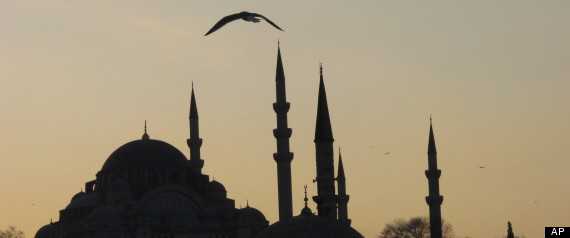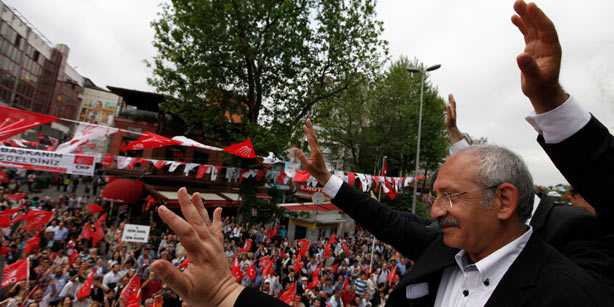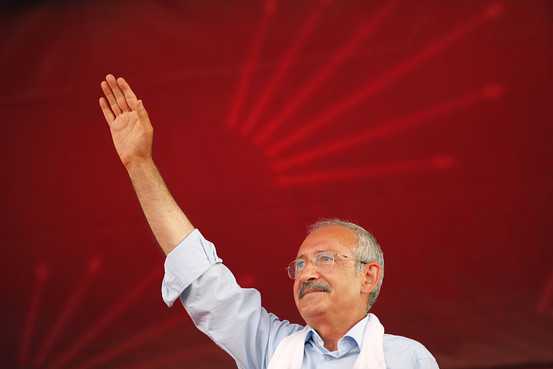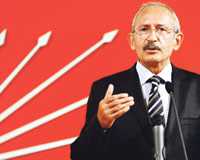ANKARA, Sept. 26 (Xinhua) — Turkey quit the negotiation strategy with the outlawed Kurdish Workers’ Party (PKK) as the organization sharply increased its attacks against soldiers and civilians.
Ankara would only keep talks with the political leg of the Kurdish movement in the parliament, a Turkish official said Monday, indicating escalation of armed actions against the PKK.
“The negotiations are now on the shelf. This struggle will last until the PKK lays its weapons down,” Turkish Prime Minister Recep Tayyip Erdogan was quoted by Daily Hurriyet newspaper as speaking to a group of journalists on Monday.
The PKK has declared unilateral ceasefire several times during the negotiations. However, it ended the latest six-month ceasefire in February and shifted to an “active defense” position in which its members defend themselves against any attack.
Abdullah Ocalan, the PKK’s jailed leader, publicized in July through his lawyers that he had agreed with government officials to set up a “peace council” that aimed at ending the conflict. Just when his remarks nearly ended the decades-long struggle, intense attacks from the PKK changed the momentum of the talks and drove the government to return to hardline policies against the PKK.
Last week, the Kurdistan Freedom Falcons (TAK), a radical Kurdish group and a PKK front, claimed responsibility for a bomb attack that killed three people and injured 34 others in downtown Ankara.
In an attack on a police station on Saturday, six Turkish soldiers died and 11 others injured in the Kurdish-dominated village of Belenoluk in Siirt province.
The increase of PKK attacks came days after the Turkish government threatened to launch a cross-border ground operation against PKK camps in northern Iraq.
In earlier September, Turkish Interior Minister Idris Naim Sahin signaled that Ankara was preparing a ground operation in northern Iraq. The Turkish Air Force has bombed suspected PKK targets repeatedly since Aug. 17.
Turkish Deputy Prime Minister Bulent Arinc announced Monday that the government would submit to the parliament a motion to allow the Turkish armed forces to launch cross-border air and ground operations for another year.
The increasing attacks by the PKK “are a result of the cross- border operations” targeting the PKK bases in northern Iraq, which was “having significant results,” Erdogan said.
“As far as I am concerned, they are now seeking revenge, as they incurred serious losses in the military operations,” Erdogan told journalists Monday, adding that the Turkish armed forces on the border would step up actions.
“They will be more effective, as they will be permanently based there. 5,000 people have been recruited. They are now undergoing training. Special operation units will also enter the cities,” he said.
In spite of the escalating tension, Erdogan is to hold discussions with the pro-Kurdish Peace and Democracy Party (BDP), which refused to enter the parliament in protest of the ban on their elected deputies.
Several imprisoned Kurdish deputies were elected in the elections in July, but the court did not let them to enter the parliament.
“If the BDP enters Parliament, then we would hold political negotiations with them,” Erdogan said.
Turkey and Iran were also cooperating against the PKK, Erdogan said, recalling that he met with Iranian President Mahmoud Ahmadinejad and Iraqi President Jelal Talabani in New York last week.
Ankara was mulling every possible measures, “including ground operations into northern Iraq,” against the PKK, Erdogan said.
On the other hand, Turkey’s main opposition Republican People’s Party (CHP) harshly criticized the government for mounting terror attacks and talks with Ocalan.
“If there is terror in Turkey today, the (ruling party) AKP government holds the sole responsibility. They are the ones who dragged Turkey into the quagmire of terror,” said CHP leader Kemal Kilicdaroglu.
More than 40,000 people have been killed in the conflict since the PKK, which was listed as a terrorist organization by Turkey, the United States and the European Union, took up arms to create an ethnic homeland in southeastern Turkey in 1984.
Editor: Mu Xuequan






